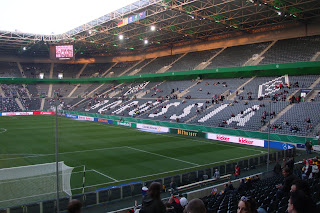Germany vs Australia (1:2) (International Friendly, 29. March 2011)
M. Gomez 1:0 (26.), D. Carney 1:1 (61.), L. Wilkshire 1:2 (64.)
Attendance: 30.152
Cost: 20 Euro
Programme: Aktuell (Free)
CLUB HISTORY: (wiki)
The German national football team is the football team that has represented Germany in international competition since 1908. It is governed by the German Football Association (Deutscher Fußball-Bund), which was founded in 1900.
From 1950 to 1990, it was more or less the team of West Germany[4] as the DFB is based in Frankfurt, located in the former West Germany. Under Allied occupation and division, two other separate national teams were also recognized by FIFA: the Saarland team (1950–1956) and the East German team (1952–1990). Both have been absorbed along with their records (caps and goal scorers) by the current national team. The official name and code "Germany FR (FRG)" was shortened to "Germany (GER)" in 1990.
Germany is historically one of the three most successful national teams at international competitions, having won a total of three World Cups and three European Championships. They have also been runners-up three times in the European Championships, four times in the World Cup, and further won four 3rd places. East Germany won Olympic Gold in 1976. Germany is the only nation to have won both the men's and women's World Cups. Germany rivalries include England, Netherlands, and Argentina.
HONOURS:
FIFA World Cup Champions: 1954,1974, 1990
FIFA World Cup Runners Up: 1966, 1982, 1986, 2002
EURO Champions: 1972, 1980, 1996
EURO Runners Up: 1976, 1992, 2008
STADIUM HISTORY: (wiki)
Borussia-Park in Mönchengladbach is the home stadium of German football Bundesliga team Borussia Mönchengladbach. It replaced the smaller Bökelberg stadium, which no longer satisfied modern safety standards and international requirements, in July 2004.
Borussia-Park has a capacity of up to 54,057, of which 16,145 are standing-room only due to popular demand. For international games, the standing room is converted into temporary seating for a total seating capacity of 37,912.
The new stadium features amenities such as VIP lounges, fanshop, bar and museum, and cost 85 million euro to construct.
Despite its large capacity and relative youth, the stadium missed out on holding matches during the 2006 World Cup, which Germany hosted. It was the largest capacity Bundesliga stadium to do so.
The German national football team is the football team that has represented Germany in international competition since 1908. It is governed by the German Football Association (Deutscher Fußball-Bund), which was founded in 1900.
From 1950 to 1990, it was more or less the team of West Germany[4] as the DFB is based in Frankfurt, located in the former West Germany. Under Allied occupation and division, two other separate national teams were also recognized by FIFA: the Saarland team (1950–1956) and the East German team (1952–1990). Both have been absorbed along with their records (caps and goal scorers) by the current national team. The official name and code "Germany FR (FRG)" was shortened to "Germany (GER)" in 1990.
Germany is historically one of the three most successful national teams at international competitions, having won a total of three World Cups and three European Championships. They have also been runners-up three times in the European Championships, four times in the World Cup, and further won four 3rd places. East Germany won Olympic Gold in 1976. Germany is the only nation to have won both the men's and women's World Cups. Germany rivalries include England, Netherlands, and Argentina.
HONOURS:
FIFA World Cup Champions: 1954,1974, 1990
FIFA World Cup Runners Up: 1966, 1982, 1986, 2002
EURO Champions: 1972, 1980, 1996
EURO Runners Up: 1976, 1992, 2008
STADIUM HISTORY: (wiki)
Borussia-Park in Mönchengladbach is the home stadium of German football Bundesliga team Borussia Mönchengladbach. It replaced the smaller Bökelberg stadium, which no longer satisfied modern safety standards and international requirements, in July 2004.
Borussia-Park has a capacity of up to 54,057, of which 16,145 are standing-room only due to popular demand. For international games, the standing room is converted into temporary seating for a total seating capacity of 37,912.
The new stadium features amenities such as VIP lounges, fanshop, bar and museum, and cost 85 million euro to construct.
Despite its large capacity and relative youth, the stadium missed out on holding matches during the 2006 World Cup, which Germany hosted. It was the largest capacity Bundesliga stadium to do so.















No comments:
Post a Comment